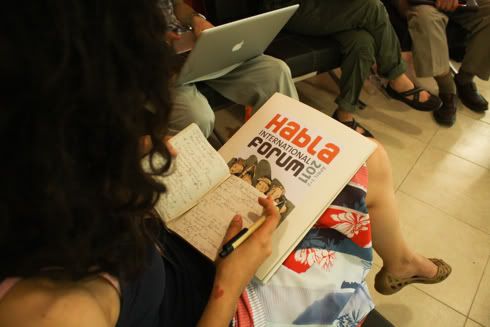
Published previously here at The Huffington Post.
In the now widely-shared commencement speech Steve Jobs gave at Stanford, he shares the story of three moments in his life that were transformative: his dropping out of college, his being fired from Apple, and his first diagnosis of cancer. We might perceive each of his examples as a different kind of failure whether they be societal or biological, yet Jobs points out that these supposed "failures" were necessary in his development as a human being and in his successes.
Habla: The Center for Language and Culture recently hosted an education forum with the topic, "Beauty in Failure: Experimentation and Risk in Education." Education leaders gathered from different countries to share their ideas about how failure is an essential aspect of our development as humans and how we, therefore, need to find ways to embrace -- not shun -- failure in our educational settings. Although all educators were speaking from many different cultural contexts, some clear through-lines emerged from the conference.
One area of agreement was that most schools demand constant achievement. Although this is certainly true in today's culture of testing where we measure students, teachers, schools, and districts by a battery of standardized tests, it's important to note that this trend isn't new. Students have been traditionally tracked by various tests including IQ tests and SATs. For decades schools have posted student rankings based on grades in the hallways and given the honor of valedictorian to the students with the highest GPA. At the classroom level, we evaluate our students through daily homework assignments, in-class quizzes, tests, and papers in up to seven subjects. In such an environment, students must strive to get the right answers in numerous micro-assessments throughout the day.

- Sam Seidel at the Habla Forum
This demand for unceasing achievement contrasts with the business practices of some of our leading companies. At the Habla Forum educator and writer Sam Seidel, author of Hip Hop Genius, highlighted in his speech different businesses that value time spent "off-task." Pixar built Pixar University, a place where any employee can take various classes in such things as improvisation, drawing, or scriptwriting regardless of job description. Google instituted the now famous "twenty percent time" where engineers spend one day a week working on whatever personal projects they like. Sam asks us to "imagine the kinds of breakthroughs we might see in education if we all got 20% of our time just to experiment?"
There are some school settings that do embrace a kind of learning where students are encouraged to fail and then try again. One example is Chicago Arts Partnerships in Education that partners teachers in schools with artists who collaborate to design cutting-edge creative experiences for students in Chicago public schools. Another is an international biodiversity initiative led by biologist Dan Bisaccio where students track the foliage and animal life on a small portion of land and report their findings to the Smithsonian Institution's Biodiversity & Monitoring Program. In an after-school organization, New Urban Arts in Providence, RI, youth are mentored by professional artists one-on-one. One student pointed out, "In school, you learn by remembering. At New Urban Arts, you make mistakes and learn from them. In school you just get an 'F' for that."
Rather than valuing short-term assignments, these settings welcome complex, multi-layered projects that students engage in individually or collaboratively. In these projects there is ample room for multiple-drafts, for mucking things up along the way, thinking through difficulties and problems, and then working to get it right. In a recent article in the New York Times, Dominic Randolph, headmaster of Riverdale County School, points out how important the behavioral trait of "grit" is for working through problems, "The idea of building grit and building self-control is that you get through failure and in most highly academic environments in the United States, no one fails anything."
We realized that failure is indeed not always beautiful. Steve Jobs' three examples were traumatic, and after each he describes the experience of feeling lost. Yet, if students and teachers aren't willing to take risks, to try new things, and to experiment, then there is little chance for true growth and learning. When we all have an opportunity to fail, when there are people to support us and gently guide us through our failures, when we have the chance to reflect and learn from our mistakes and eventually reach epiphanies of understanding, then we are learning not only math or history, but how to make the most of all the experiences given to us throughout our lives.
To see information about the next Habla Forum in 2013 click here.
A special thank you to Arnold Aprill, Gail Burnaford, Sam Seidel, Cynthia Weiss, Kathleen Cushman, and Maria del Mar Patron Vazquez whose ideas all contributed to the Forum and this article.